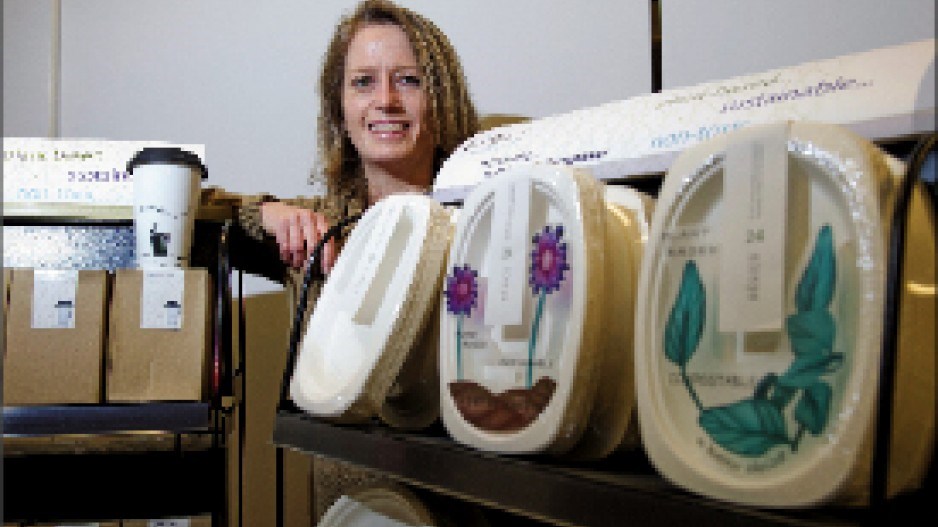When Susanna Carson went to Toronto to receive a national award for women entrepreneurs in sustainability, she was in a sustained state of awe.
“One of the things that I was completely humbled by was the calibre of businesswomen whose company I was in,” said the founder and CEO of Vancouver’s BSI Biodegradable Solutions, which designs and distributes compostable packaging and food service-ware products.
Recipient of the TPH Sustainability Award, Carson was one of seven winners in different categories at the 2011 RBC Canadian Women Entrepreneur Awards chosen from more than 3,000 nominees.
“We all have moments of self-doubt, and when you own your own business once every six months you’re like, ‘I quit, I can’t do this anymore,’” she said. “To be with amazing women like that, to have my ideas and business plan vetted out, and being given that award reaffirmed that when I hit that six-month bump I shouldn’t quit.”
Carson got her start when she was finishing her science masters at the University of British Columbia. She brainstormed with a fellow student after Vancouver announced the 2010 Winter Games would be sustainable.
“She told me about an event in Europe where all of the food trays had been made out of animal fodder, and at the end, the trays went off to the local pig farm and got consumed.”
Carson couldn’t find the trays. “Instead I found an entire world of compostable packaging that was just in its infancy.”
She launched her company in 2005, registering $870 in sales the first year. Revenue climbed and now there are eight staff.
“We’ve stabilized just under the million-dollar mark.”
Other local women entrepreneurs nominated in the sustainability category include Nicole Stefenelli, founder and CEO of Richmond-based Urban Impact, and Alana Husby, founder and CEO of Coast EcoTimber of Vancouver.
Shocked into action
Like Carson, Stefenelli was also inspired by European advancements in sustainability. It began with a trip to Europe in the late 1980s when she was 18.
“I was very much impacted by the overall green movement in Europe with respect to waste management and resources and recycling,” she said. “Coming back to North America I was so shocked by the differential. There was practically nothing being done here.”
As part of her studies at UBC, Vancouver-born Stefenelli set out to prove that commercial recycling was viable. “Four restaurants, bless them all, were patient enough to put up with an idealist in my late teens and they allowed me to help them separate their recyclables and get that off to a recycling facility.”
She started Urban Impact in 1990 with a rented truck. “We have over 100 staff and we serve about 5,000 clients here in the Lower Mainland. We do both collecting and processing, which means that we receive that product, grade it and put it into a presentable form where it can be shipped.” There’s also a collection division in Calgary.
Urban Impact is a family-run business with her husband Rod Nicolls as vice-president operations. “He became involved in the business in 1992, and we got married a few years after that. And we still happen to like each other enough to work with each other,” she said with a chuckle.
For Husby of Coast EcoTimber, working in forestry goes back five generations on Haida Gwaii (Queen Charlotte Islands) where she was born. After becoming a certified forest technician at the British Columbia Institute of Technology, she worked for her father for a year honing skills like grading and scaling. Then she worked with the top custom-cut experts in B.C.
Husby said she found her attention drawn to waste piles and fully utilizing wood.
“Somebody else would see a burnt-out pulp log that was useless, and I’d see a chaise, or a bench or a table top.
“I realized I wanted to be on the eco side.” She also realized she wanted to start her own business. “I’ve always been kind of an entrepreneur. I don’t work well for others.”
Husby began her business in 2005 with Arnie DeWitt, who is the international operations partner and first told her about Panama where the company recovers underwater hardwood logs from a lake. Last year they bought a sawmill in Panama and employ about 90 people.
The underwater logging and the mill have both earned Forest Stewardship Council certification.
“I’m very, very proud of that.” •




